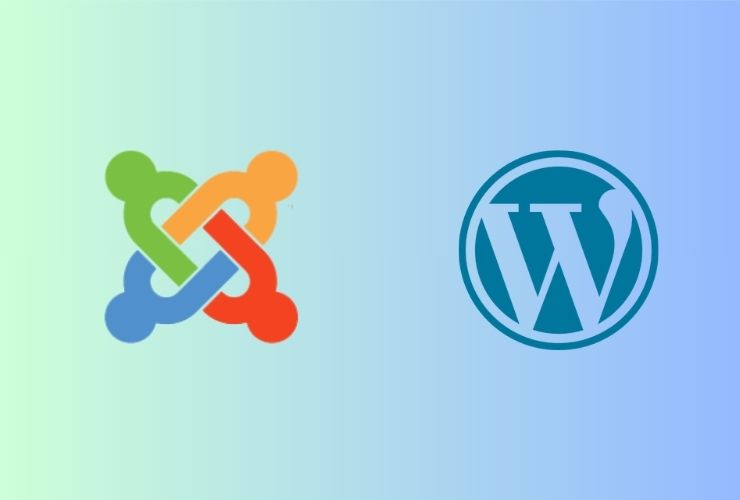Two of the most recognized open-source CMS platforms are Joomla and WordPress. Both Joomla and WordPress take different approaches to SEO, therefore the decision to go with either is based on your project goals, technical ability, and the features that are going to support the growth of your site.
When creating a website, Search Engine Optimization (SEO) is typically the focus of the digital marketing strategy. How your website ranks on Google can affect your site’s traffic, authority of your brand, and conversions. Therefore, determining which Content Management System (CMS) you use can have a huge impact on your SEO as well.
This article will outline the SEO benefits and limitations of Joomla and WordPress to help you find the best platform for your SEO.
1. SEO-Friendly URLs
WordPress:
With plugins like Yoast SEO, WordPress offers a straight-from-the-box way to create clean, readable, and even keyword-optimized URLs using its Permalink settings. So with some clicks you can structure URLs that are SEO-compliant, such as:
yourdomain.com/seo-best-practices/
Joomla:
Using Joomla means you can also build SEO-compliant URLs, but the company first requires you to set some things up: you must:
- Enable SEF (Search Engine Friendly) URLs
- Rename htaccess.txt to .htaccess
- If you want, enable URL rewriting
After you set up those actions, Joomla URLs are as good as WordPress, although Joomla is a less beginner-friendly process actually configuring.
Verdict Extended:
WordPress is better for ease of use, but Joomla can perform quite well in the end, when fully set-up.
2. Meta Tags and on-page Optimization
WordPress:
Plugins like Yoast SEO and Rank Math allow you to perform the following:
- Real-time content analysis of articles
- Analyze arranged ranking by score the main focus keyword
- Preview meta title and description
- Canonical URLs
- Manage schema markup
These are all things in which can allow an absolute newbie to deal with the intricacies of SEO like a pro.
Joomla:
While Joomla allows you to create custom meta tags per article or menu item, the advanced options require you to use third-party extensions like sh404SEF or Easy Frontend SEO. While these will work and can be quite powerful, they are not incorporated and potentially not user-friendly like their WordPress counterpart; they will require work on your part.
Verdict Extended:
It’s well-established, WordPress wins the race for content-focused SEO, usability and the abundance, versatility and cost of use of plugins.
3. Site Speed & Performance
WordPress:
Performance varies greatly based on the theme and plugins used. If you have a lot of plugins, your site could be slowed down and would require plugins like:
- WP Rocket
- LiteSpeed Cache
- Asset CleanUp
Joomla:
Defaults to a “leaner” site. Joomla comes with built-in caching, Gzip compression, and fewer processes running in the background meaning it performs well without the need for additional optimization tools.
Extended Verdict:
Joomla edges WordPress a little in performance, especially if you are using shared hosting or you’re under heavy loads.
4. Mobile Responsiveness
WordPress & Joomla:
Both platforms can support responsive design due to modern templates or themes. You almost have no issues with mobile, whether you are with Astra in WordPress or Helix Ultimate in Joomla. Mobile optimization is only about the quality of your template and not the underlying CMS architecture.
Extended Verdict:
Draw. Pick a responsive template and the mobile optimization tools you need.
5. Sitemap and Robots.txt Management
WordPress:
SEO plugins also create XML sitemaps automatically and include dashboards to edit the robots.txt or .htaccess files without needing FTP access to the file system.
Joomla:
Extensions such as OSMap will help create a sitemap, but robots.txt editing usually requires access to the file to edit or special extensions.
Extended Verdict:
WordPress is overall quicker and easier to use for sitemap and robots files.
6. Customization and Technical SEO
Joomla:
Joomla enables developers complete management of head tags, structured data, canonical URLs, and routing. You can override views, change metadata output, and create special templates to meet specific SEO needs—ideal for custom SEO solutions at the enterprise level.
WordPress:
Most of the customization work in technical SEO is done through plugins unless a developer goes into the theme files directly or is building custom plugins.
Extended Verdict:
While Joomla provides more freedom for technical SEO, WordPress is easier for non-developers.
7. Security and stability regarding SEO
Joomla:
Security affects SEO–sites that get hacked can be penalized by Google. Joomla features:
- Two-factor authentication
- Session management
- Built-in ACL (Access Control List)
- CAPTCHA support
WordPress:
WordPress is typically also relying on third party plugins for security like Wordfence or Sucuri. Additionally, it is more likely to experience an attack due to the size and popularity of its infrastructure.
Extended Verdict:
Joomla has more built-in form of security, which, over time, assists in preserving your SEO integrity.
8. Extension and plugin ecosystem
WordPress:
Has likely thousands of SEO related plugins with everything from internal linking to schema to AMP to redirection.
Joomla:
Has a plethora of solid extensions for SEO, although the ecosystem is not as large. However, many times the build of Joomla will require far fewer tools to get the same result.
Extended Verdict:
WordPress has an abundance of variety. Joomla leans toward efficiency.
Final thoughts: Which is Better for SEO: Joomla or WordPress?
When weighing Joomla vs WordPress for your next SEO project, think about your technical comfort level, complexity of the project, and your scalability requirements.
If you want to get started as quickly as possible, have access to powerful plugins, and be introduced to SEO with a generally more intuitive experience without writing much code, choose WordPress.
If you are a developer or managing a complicated site that requires deeper customization, require robust security, and want your technical SEO natively controlled, choose Joomla.
Remember, successful SEO is less about the CMS platform and more about how you implement best practices, from clean URLs and clean meta data to mobile optimization and quality content.













 Database Development
Database Development












































